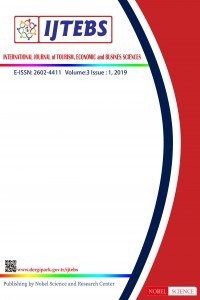ABSORPTIVE CAPACITY: AN EMPIRICAL STUDY ON TURKEY’S HOTEL COMPANIES
ABSORPTIVE CAPACITY: AN EMPIRICAL STUDY ON TURKEY’S HOTEL COMPANIES
Absorptive capacity plays a key role in determining a firm’s capability to access and make use of external knowledge. It also refers to the ability to locate new ideas and to incorporate them into an organization’s processes, and this is widely seen as a major contributor to organizational performance. It includes organizational routines and strategic processes by which a firm acquires, assimilates, transforms, and exploits knowledge. In this study, absorptive capacity was examined in terms of hotel operations in Turkey. The study aimed at uncovering the effects of the dimensions of absorptive capacity (acquire, assimilate, transform, exploit) on firm performance and determining if there was a difference in the dimensions of absorptive capacity according to the hotel’s star and hotel age. Data were collected using a questionnaire and 124 applicable questionnaires were gathered at the end of the study. According to results of regression analysis, it was found that the dimensions of acquire, assimilate and adoption of absorptive capacity had a significant effect on firm performance. In contrast to expectations, no significant effect of the transform dimension of absorptive on firm performance was determined. Anova analysis was used to determine whether if there was a difference in the dimensions of absorptive capacity according to the hotel’s star and hotel age. According to the analysis results, no difference was detected.
Keywords:
Absorptive Capacity, Hotel Companies,
___
- Bergh, D. D. and Lim, E. N. (2008). Learning how to restructure: Absorptive capacity and improvisational views of restructuring actions and performance. Strategic Management Journal, 29(6), 593-616.
- Bolívar-Ramos, M. T.; García-Morales, V. J. and Martín-Rojas, R. (2013) The effects of information technology on absorptive capacity and organisational performance, Technology Analysis & Strategic Management, 25:8, 905-922,
- Cohen, W. M.,and Levinthal, D. A. (1989). Innovation and learning: The two faces of R&D. The Economic Journal, 99(397), 569–596.
- Cohen,W. M., and Levinthal, D. A. (1990). Absorptive capacity: A new perspective on learning and innovation. Administrative Science Quarterly, 35(1), 128–152.
- Flatten, T. C.; Engelen, A.; Zahra, S. A. and Brettel, M. (2011). A measure of absorptive capacity: Scale development and validation. European Management Journal, 29(2), 98-116.
- Fosfuri, A. and Tribó, J.A. (2006). Exploring the antecedents of potential absorptive capacity and its impact on innovation performance. Omega, 36(2), 173-187.
- García-Morales, V. J.; Ruız-Moreno, A. and Llorens-Montes, F. J. (2007). Effects of technology absorptive capacity and technology proactivity on organizational learning, innovation and performance: an empirical examination, Technology. Analysis & Strategic Management, 19(4), 527-558.
- Gupta, A., K. Smith and C. Shalley, (2006). The interplay between exploration and exploitation. Academy of Management Journal, 49, 693–706.
- Harvey, G.; Skelcher, C.; Spencer, E.; Jas, P. and Walshe K. (2010). Absorptive Capacity in a non-market environment: A knowledge-based approach to analysing the performance of sector organizations. Public Management Review, 12(1), 77-97.
- Kotabe, M.; Jiang, C. X. and Murray, J. Y. (2011). Managerial ties, knowledge acquisition, realized absorptive capacity and new product market performance of emerging multinational companies: A case of China. Journal of World Business, 46(2), 166-176.
- Kim, L. (1998). Crisis construction and organizational learning: Capability building in catching-up at Hyundai Motor. Organization Science, 9(4), 506-521. Lane, P. J., Koka, B. R. and Pathak, S. (2006). The reification of absorptive capacity: A critical review and rejuvenation of the construct. Academy of Management Review, 31(4), 833–863.
- Lane, O. J. and Lubatkin, M. (1998). Relative absorptive capacity and interorganizational learning. Strategic Management Journal, 19(5), 461–477.
- Lichtenthaler, U. (2016). Absorptive capacity and firm performance: an integrative framework of benefits and downsides, Technology Analysis & Strategic Management, 28(6), 664-676.
- O’Connor, G. C. (2008). Major innovation as a dynamic capability: A systems approach. Journal of Product Innovation Management, 25(4), 313–330.
- Park, G. and Kang, J. (2009). The effects of teacher firms’ characteristics and student firms’ absorptive capacity on firm performance in technology alliances. International Journal of Innovation Management, 13(3), 393-409.
- Rebolledo, C.; Halley, A. and Nagati, H. (2009). The effects of absorptive capacity on operational performance within the context of customer-supplier relationships. Supply Chain Forum an International Journal, 10(2), 52-62.
- Stock, G., Greis, N. And Fischer, W. (2001). Absorptive capacity and new product development. Journal of High Technology Management Research, 12(1), 77.
- Thérin, F. (2007). Absorptive capacity: An empirical test of Zahra and George’s contribution in small business settings. Gestion 2000, 4, 17-29
- Thomas, R. and Wood, E. (2014). Innovation in tourism: Re-conceptualising and measuring the absorptive capacity of the hotel sector. Tourism Management, 45, 39-48.
- Thomas, R. and Wood, E. (2015). The absorptive capacity of tourism organisations, Annals of Tourism Research, 54, 84–99.
- Tzokas, N.; Kim Y. A.; Akbar H. and Dajan, H. (2015) Absorptive capacity and performance: The role of customer relationship and technological capabilities in high-tech SMEs. Industrial Marketing Management, 47, 134-142.
- Valentina, N and Passiante, G. (2009) Impacts of absorptive capacity on value creation, Anatolia, 20(2), 269-287.
- Yılmaz, A. (2013). Absorptive capacity and firm performance: A research in ESO, Unpublished Doctoral Dissertation, Anadolu University Social Sciences Institute, Eskişehir
- Zahra, S. A., and George, G. (2002). Absorptive capacity: A review, reconceptualization, and extension. Academy of Management Review, 27(2), 185–203.
- Zerenler, M. (2005). The performance measurement system design and a study on performance measurement of manufacturing systems, The International Journal of Economic and Social Research, 1, 1-36
- Başlangıç: 2017
- Yayıncı: Nobel Bilim ve Araştırma Merkezi Limited
Sayıdaki Diğer Makaleler
Y KUŞAĞININ GİRİŞİMCİLİK EĞİLİMLERİNİN DEMOGRAFİK DEĞİŞKENLER İLE İNCELENMESİ
Gönül KONAKAY, Harun DEMİRKAYA, Sabiha Sevinç ALTAŞ, Arzu Yüce MORKOYUNLU, Ayfer ÖZMEN
Abdülkadir AKTURAN, Ayşe GÜNSEL, Mevlüt BECERİKLİ
ABSORPTIVE CAPACITY: AN EMPIRICAL STUDY ON TURKEY’S HOTEL COMPANIES
Emine KALE, Özlem BAŞAR, Ahmet AKNAR
A RESEARCH ON CORPORATE SOCIAL RESPONSIBILITY PERCEPTIONS OF MARITIME FACULTY STUDENTS
Gönül KAYA ÖZBAĞ, Tülay POLAT ÜZÜMCÜ
Sami KARACAN, Esin KARACAN, Yüksel GÜNGÖR
ORGANIZATIONAL BEHAVIOR AND SOCIO-BIOLOGICAL APPROACH
REVERSE INNOVATION: CAN INNOVATION FLOW FROM TURKEY TO DEVELOPED COUNTRIES?
